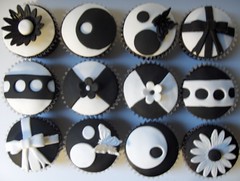Contrast, as defined in the dictionary, is: To set in opposition in order to show or emphasize differences. Black and white are two contrasting “shades” (they’re not colours!) and can be used as a visual way to describe contrast in songwriting.

- Image by clevercupcakes via Flickr
When you’re first writing a song (and I ALWAYS emphasize this!), you are not thinking about technique or creating dynamics, tension or contrast…you are simply expressing something in its raw form. Many songwriters never get beyond this raw state, never develop their writing or learn to polish their songs, and the lack of contrast is often a result. If absolutely everything in a room was white, how boring would that be? This is what songwriters who are just starting out don’t necessarily recognize in their own songwriting.
So what exactly IS contrast in songwriting? Well, it can be achieved in different ways. If your song has verses and a chorus, contrast may be created between those song parts. For example, the verses might have a melody in a lower range, and the chorus in a higher range. Another way to achieve contrast would be a different chord progression in the chorus as compared to the verse. It can be a subtle as starting the chorus with a different chord than the verses start with. Contrast doesn’t have to be “in your face”, it simply creates a feeling of freshness between the parts of a song. A bridge can be a really effective contrast. You’ve set your listener up, starting them off with a verse and chorus, another verse and chorus, and now you want to give them a breather, so you create a bridge.
So, melody and chord progressions can be used to create contrast, what about lyrics? The most subtle lyrical contrast would be in terms of the subject by changing the point of view or creating a different idea (but not too different!) between two parts of a song. A very simple example would be where the verses are in the first and second person (I, me, my and you), and the chorus being in the third person (she, he, they).
But a broader and more effective contrast would be to actually change the form of the song by changing the rhyme scheme or the length of lines and the meter. You see this happening most of the time between a verse and a chorus; the verse has its own rhyme scheme and meter and the chorus changes to another set.
Contrast can also be created in the production of the song where the instrumentation changes between different parts. This has less to do with the songwriting, but if your song is missing some contrast or the contrast is not strong enough, adding or changing instruments in the production and recording phase can enhance the parts so they stand out a little more separately from each other. What often happens with drums in a chorus, for instance, is that the rhythm stays more or less the same, but cymbals (or what they call a “ride”) are added. Drums also accent a coming change when they do small fills just beforehand.
Drums are only one example of the use of contrast in production, other instruments like strings can also be effective in signifying a different part of a song. But for the most part, you want to be able to create contrast in the writing itself so you don’t have to rely on production to do it for you.
Contrast is something that be the difference between your audience being continuously drawn into a song and putting them to sleep! Listen to one of your favourite songs and see if you can spot what they do to create contrast. And then listen to one of your own songs to determine if you are creating enough contrast to keep it interesting!
IJ
![Reblog this post [with Zemanta]](http://img.zemanta.com/reblog_e.png?x-id=f9650140-e2de-4b95-b3eb-7b6b19a3cfea)

![Reblog this post [with Zemanta]](http://img.zemanta.com/reblog_e.png?x-id=362ff86e-3081-4862-ae9d-0c7e36a9822e)
![Reblog this post [with Zemanta]](http://img.zemanta.com/reblog_e.png?x-id=9beef88e-ede0-4995-8e1a-fbdc5effc3cd)